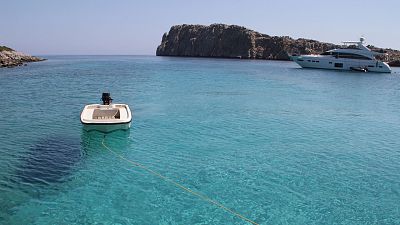As president, at a minimum, Calviño must commit to consulting people impacted by EIB projects as part of their design and either ensuring or providing remedies for negative environmental and social impacts of its investments, Sutharee Wannasiri writes.
European Investment Bank President Nadia Calviño’s recent comment for Euronews that the EIB’s value is de-risking green investment for private investors builds on broader aims stated by the EIB to become a leader in green finance and to back large-scale projects to tackle global issues, including but not limited to, climate change.
While this might sound like a noble ambition, communities impacted by EIB projects know there is a lot more to the story: the EIB has already revealed time and again that it is ill-equipped to lead a green transition.
The EIB has a poor track record when it comes to selecting viable investments in the first place.
In fact, the issue most frequently raised by local communities impacted by EIB-backed projects to its complaint mechanism (at 46% of all complaints) is that the bank did not perform adequate due diligence on projects in the first place.
A powerline project no one wants to reel in
As an advocate at Accountability Counsel, I have seen this firsthand in Nepal, where communities are seeking justice for harms caused by an EIB-supported renewable energy project.
For that project, nobody consulted with, or even notified, some of the community members living in the planned route for the transmission line.
In fact, for some, the first they learned that a high-voltage powerline was going to cross through their land, was when they witnessed people marking the already-decided route with red paint.
When community members raised their concerns about the loss of land, livelihoods, and forests — not to mention a complete violation of indigenous peoples’ right to Free, Prior, and Informed Consent (FPIC) — Nepal securities forces resorted to violence.
In 2021, EIB’s independent accountability process confirmed what communities already knew — that the project did not comply with EIB’s own rules.
And yet, three years after that finding, the EIB has still not brought the project back into compliance nor remediated the harm caused.
Why finance repeat climate offenders?
The second-most frequent complaint raised about EIB’s projects (representing 43% of all complaints) is that they cause harm to the environment.
This is not only a problem for the communities who live near these projects, but it also undermines EIB’s climate ambitions.
An analysis conducted by my organization found that multilateral banks like the EIB often finance repeat offenders of environmental and human rights violations.
For instance, the Nepal Electricity Authority (NEA) has implemented at least 20 hydropower and energy projects across the country.
Affected people have filed complaints against nine different NEA projects, demonstrating a pattern of NEA’s practice of inadequate compensation and improper consultation, flawed environmental and social impact assessments, and disregard for the collective rights of indigenous communities.
With EIB’s spotty compliance with its own rules and its failure to hold itself responsible for the damage its projects have caused, how can the bank be truly equipped to select green projects and de-risk them for the private sector?
A chance to change course for the better is there
There is an opportunity to change course for the better, with the EIB having recently appointed two new leaders: Calviño as president and Vasco Amaral Cunha as the new head of its complaints mechanism.
As president, at a minimum, Ms Calviño must commit to consulting people impacted by EIB projects as part of their design and either ensuring or providing remedies for negative environmental and social impacts of its investments.
Mr Cunha, for his part, should narrowly focus on ensuring that the EIB’s complaint mechanism lives up to its aims of delivering “fair and sustainable outcomes for everyone”.
Over the next year, this will require updating the complaint mechanism’s mandate and procedures to adequately hold the EIB accountable for its climate ambitions. More immediately, Cunha can get the transmission line case in Nepal back on track.
Communities have repeatedly requested the EIB’s complaints mechanism and the EIB management to facilitate a good-faith dialogue between the affected communities and the Nepal Electricity Authority. Cunha can start off his new tenure by finally opening that dialogue.
If Calviño and her team hope to transform the EIB into a leader in the green finance space, they should start by making sure the EIB’s own projects aren’t part of the problem.
If not, the EIB will keep greenwashing for the private sector, and the green transition will remain an illusion.
Sutharee Wannasiri is Communities Associate at Accountability Counsel.
At Euronews, we believe all views matter. Contact us at view@euronews.com to send pitches or submissions and be part of the conversation.





